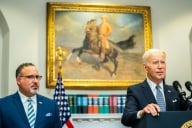You have /5 articles left.
Sign up for a free account or log in.

Getty Images
College and university leaders have been consumed since last summer with trying to understand public attitudes about them, as surveys and studies -- like this and this and this and this -- have delivered evidence of growing skepticism and doubts about the value of what consumers and society get from higher education.
Gallup injected yet more data into the mix Friday, with a new survey that both reinforces the idea that higher education has seriously alienated white male Americans without a degree and underscores that people think very differently about the topic depending on the words you use.
The new Gallup survey, conducted last month, asked the polling organization's standard question about whether Americans "have confidence" (and how much) in various institutions. It was one such Gallup survey last summer (along with a parallel survey from the Pew Research Center) that drove a powerful narrative suggesting that Republicans view higher education much more skeptically than Democrats do, and that people from the two viewpoints are troubled by different things (Republicans largely liberal campus politics and perceived indoctrination, Democrats largely rising college prices and debt).
The new survey digs more deeply in two ways: by looking at how a broader range of demographic groups answer the "confidence" question, and by asking Americans about their confidence not just in "higher education," as the last survey did, but in "colleges and universities," "community colleges," and "postsecondary education." Brandon Busteed, who oversees Gallup's work on education and work-force issues, said the organization decided to investigate further after an Inside Higher Ed article in December discussed data suggesting differences in public attitudes about four-year universities versus community colleges, for example. (Note: Gallup and Inside Higher Ed work together on a series of surveys and events, but Inside Higher Ed played no role in this survey.)
As seen in the table below, respondents to Gallup expressed notably more confidence in "higher education" than in "colleges and universities," with "community colleges" and "postsecondary education" in between.
That difference holds up, though to somewhat varying degrees, across most of the demographic breakdowns Gallup examines (more on that in a bit). In a blog post about the data, Busteed and his co-author, Frank Newport, postulate that the difference may occur because "negative stories people hear about higher education in the media or in general conversation most often use the words 'colleges and universities,'" or that "the more general term 'higher education' connotes the positive goal of gaining more knowledge, while the more specific 'colleges and universities' has more negative connections related to specific institutions and specific practices."
Others have speculated that most of the loudest complaints leveled about colleges and universities -- particularly those related to perceived liberal bias and excessive tuition and debt levels -- are truer on balance for selective four-year colleges and universities than for community colleges. At an Inside Higher Ed conference on the topic of public skepticism about higher education this month, one Republican critic reserved most of his enmity for flagship public universities and elite private colleges. And wealthy institutions have been a primary target of Republican lawmakers in the form of the recently enacted endowment tax, arguably tapping into the sort of populist fervor that helped elect President Trump.
Sources of the Skepticism
In addition to suggesting that the public holds varying views of different cuts of academe, the new Gallup survey shows even more clearly that different groups of Americans see higher education differently (no matter how you define it).
Focusing in on respondents' answers about "higher education" (as opposed to the other groupings Gallup asked about, including "colleges and universities" and the like) reveals enormous variations in different groups' confidence.
As seen in the table below, women are significantly more confident than men are, those who lean Democratic are more confident than those who lean Republican, those who are college graduates more than those who aren't, and black and Latino Americans more confident than their white, non-Hispanic counterparts.
Add it all up and the starkest difference appears between white female college graduates and white male nongraduates. Nearly 60 percent of the former express a "great deal" of confidence in higher education, and 4 percent express "very little" or none. In contrast, only 18 percent of white male non-college graduates express a great deal of confidence, and about 23 percent say they have "very little" or no confidence in higher education.
How Much Confidence Do You Have in Higher Education?
| Great Deal | Quite a lot | Very Little/None | |
| Men | 29% | 20% | 19% |
| Women | 43 | 19 | 13 |
| Democrat/Lean Democrat | 47 | 18 | 13 |
| Republican/Lean Republican | 26 | 22 | 18 |
| College Graduate | 49 | 20 | 8 |
| Nongraduate | 30 | 19 | 20 |
| White | 33 | 21 | 15 |
| Hispanic | 42 | 17 | 19 |
| Black | 45 | 13 | 17 |
| White Female Graduate | 60 | 17 | 4 |
| White Male Nongraduate | 18 | 18 | 23 |

![Chart: Confidence in four ways of describing postsecondary education. Turning now to education, how much confidence do you, yourself, have in [colleges and universities; community colleges; higher education; postsecondary education]? For higher education, 36 percent said “a great deal,” 19 percent said “quite a lot,” 27 percent said “some” and 16 percent said “very little.” For community colleges, 29 percent said “a great deal,” 24 percent said “quite a lot,” 31 percent said “some” and 14 percent said “very little.” For postsecondary education, 29 percent said “a great deal,” 20 percent said “quite a lot,” 32 percent said “some” and 17 percent said “very little.” For colleges and universities, 23 percent said “a great deal,” 22 percent said “quite a lot,” 32 percent said “some” and 22 percent said “very little.” Source: Gallup, Jan. 8-28, 2018.](/sites/default/server_files/media/Screenshot-2018-2-25%20Words%20Used%20to%20Describe%20Higher%20Ed%20Make%20a%20Difference_1.png)








